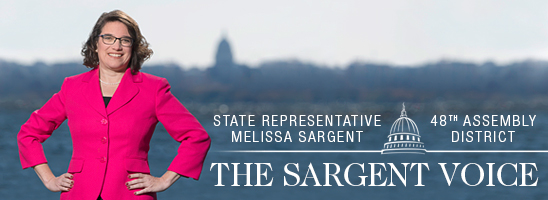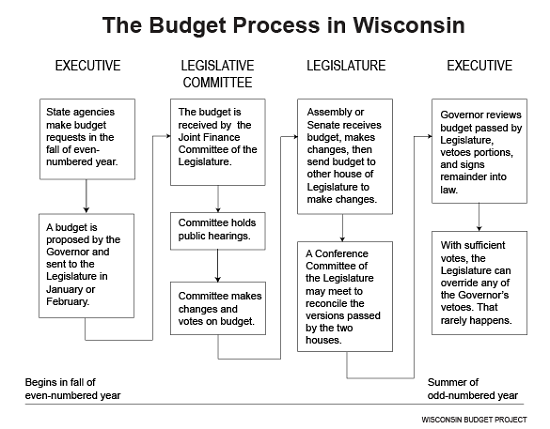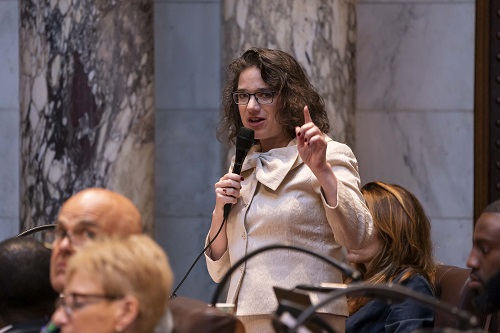
|
Friends and Neighbors, Tuesday, the Wisconsin State Assembly voted on the Republican approved 2019-2021 budget. Disappointingly, this was not the People’s Budget representative of our state that Governor Tony Evers worked so hard to create by meeting, discussing with, and listening to people all across Wisconsin. Instead, my Republican colleagues in the State Legislature have once again overriden the will of the people by stripping out key provisions of the Governor’s budget, and dramatically reducing funding for the needs of our state. Wisconsin voted for Governor Tony Evers back in November, yet time and time again we have seen the GOP working to strip away his power and threaten our state’s democracy. Not only did the people of our state vote for change and for Governor Evers, but they voted in referenda across the state in overwhelming support of legalizing marijuana, which would increase prosperity and safety in our state. They expressed their support again and again for Medicaid expansion, which would provide access to affordable and quality healthcare for Wisconsinites while saving millions of dollars for our state. They made their voices heard when it came to crucial issues such as education funding, renewable energy investments and environmental protections, meaningful gun reform, transportation solutions, a fair minimum wage, non-partisan redistricting, and more. Unfortunately, the pleas of ordinary Wisconsinites have clearly been swept under the rug, as drunk on power lawmakers chose to blatantly ignore the needs of the hardworking people of our state. The implications of the budget passed Tuesday by the Assembly are striking– with the provisions in this GOP budget proposal over 82,000 people will not have access to health coverage, over 15,000 people will be arrested for marijuana possession in our state, hundreds-of-thousands of workers will continue to make $7.25 and continue to struggle to provide for their families, and our state will continue to miss out on key opportunities for revenue creation. Governor Evers’ budget proposal represents not just a sound financial plan for our state, but a moral blueprint for a government that reflects our Wisconsin values and would work for the everyday people of our state. The Governor’s budget proposal is the People’s Budget. It reflects what the people want, and powerfully outlines a vision for a better Wisconsin. It outlines a Wisconsin where the people have access to the medicine they need through legalizing medicinal marijuana, our state expands Medicaid ensuring quality healthcare for thousands of Wisconsinites, our infrastructure is finally fixed, and education is renewed with critical investments after years of neglect. The will of the people is the law of the land, and we as elected officials have a duty to uphold the wants of our constituents– our bosses– and to work in the best interest of the people, not powerful special interests. When we put the people first our state will prosper, and I am disheartened and disappointed to see that we are failing to put people over politics with the budget that was passed yesterday.
In Service,
|

| The Budget Process |
|
What does the budget process look like? |
|
The budget process here in Wisconsin, especially with split governance, is a lengthy and complicated one: 1. Our state has a biennial budget. This means that the state budget includes information about how money will be spent for a two-year period, from July 2019 through June 2021. The entire process of developing a budget starts in the fall of even numbered years, when state agencies must submit their budget requests to the Governor. The Governor then takes these requests into consideration as he prepares his budget, outlining the highlights of their proposal in a budget address (this year Governor Evers’ budget address occurred on February 28th). 2. After the Governor’s budget address, the process moves over to the Legislature, where the Joint Finance Committee (whose current make up includes 12 Republicans & 4 Democrats) schedules hearings about the budget. The Joint Finance Committee then conduct a series of hearings around the state, where constituents are provided with the opportunity to voice their input. Once the Joint Finance Committee completes their assessment of the budget, they vote to approve a version of the budget that they conclude is best for the state, and pass that version out of committee. 3. Next, the proposal faces either the full Assembly or the full Senate (this year was the Assembly’s turn to take up the budget). One house takes the Joint Finance version of the bill and allows members to propose amendments and changes and to debate their ideas on the floor. The full membership of that house then votes on the entire bill (the Assembly did this Tuesday). The bill moves over to the other house of the Legislature, where the whole process takes place again (the Senate voted yesterday). |
|
Frequently Asked Questions About the Budget Process |
|
What happens next? Yesterday, the Wisconsin State Senate voted in favor of the Assembly budget bill that was passed on Tuesday, AB-56/SB-59. The bill will go to Governor Evers’ desk for action. Once the Governor receives the budget, the Governor has a set number of days to sign, partially veto, or fully veto the budget proposal. You can read more about the Governors’ partial veto powers here. If the Governor signs the budget, whether he signs the full document or uses partial vetoes, the bill becomes a law and the new funding levels begin for our state. While the Legislature has the statutory power to override any of the Governor’s vetoes with a two-thirds vote of both houses, neither party currently has the super-majority power necessary to do so, and it becomes an unlikely option. If the Governor does not sign the budget, both houses of the Legislature and the Governor will need to work together to find solutions and compromise to resolve a budget plan for our state. |
|
What happens if the Governor & Legislature cannot agree? The state of Wisconsin has a continuing budget, meaning that until a budget is voted upon by the Legislature and signed into law by the Governor the state will continue to run at our current funding levels from the 2017-2019 Budget. |
| Partisan Antics in the Budget Process |
|
Tuesday morning, before Legislators were expected to be on the Assembly floor to debate and vote on the GOP approved budget proposal, Republican lawmakers had still not released the final version of their budget plan. Finally, less than an hour before the floor session began, we were given a substantive 35 page amendment with 201 individual changes made to varying parts of the 1,148 page budget document. We were given no time to digest or review this amendment. Again, at around 7:30pm Tuesday evening as we debated the budget proposal, Republicans introduced another amendment to the budget on the floor of the Assembly. This amendment included an additional 11 changes. A budget should be a deliberative and substantive document that does everything it can to aid the people of Wisconsin. The fact that the GOP was scrambling at the last minute in order to take away more powers from Governor Evers by ensuring the language of the budget document was harder to partial veto, is absolutely shameful. This is not how our democracy should work, or what good governance looks like, and I am disappointed in my colleagues across the aisle for their partisan antics. |
|
Rep. Sargent speaks on Assembly Floor (06/25/19) |
| The People's Budget |
|
I know that we Wisconsinites find resilience in our enduring values, our unyielding spirit, and our strength together. The People’s Budget works to carefully weave together these principles, and truly put the people first by:
We must ensure that Wisconsin is a place where everyone is safe, can reach for their dreams, and where we invest in a better tomorrow. The People’s Budget works to ensure these goals, and proves its commitment to creating a Wisconsin that truly works for everyone through proposing long-term and sustainable solutions for our state’s future.
|
| GOP’s Budget ignores the will of the people, fails to include cannabis reform: |
|
Unfortunately, the reality is, the budget proposal put before us on Tuesday fell short in each and every one of these areas and is tone deaf to the wants and needs of Wisconsinites. We need to look no further than cannabis reform to know that this budget proposal continues to ignore the will of the people of Wisconsin, and to kick the can further down the road when it comes to finding real solutions for our state. The people of Wisconsin have said loud and clear that the prohibition of marijuana is not working. We know that Wisconsinites overwhelmingly support cannabis reform with nearly two out of three people believing marijuana sales should be taxed and regulated like alcohol sales, and over 81% of voters supporting medicinal use according to recent referenda across the state. We know that people all across our state want to see marijuana’s medicinal benefits help our communities, and to reduce the unjust and disparate impacts prohibition has on our criminal justice system, and specifically communities of color. We know that Wisconsinites want to see a pragmatic approach that provides real relief for our friends and neighbors across our state, yet the budget proposal before us today continues to ignore the people’s wishes. Further, we know that the legalization of marijuana would create endless opportunities for our state. From medicinal relief and addressing the massive and egregious racial disparities in marijuana-related arrests, to opening the door to countless family-sustaining jobs and abundant economic stimulus, cannabis reform is a win-win for our state. Just last week, Colorado surpassed tax revenue of $1 billion for their state. Yet, the GOP continues to play politics with the hardworking people of our state by crafting a budget with no substance- like frosting on a cardboard cake- full of talking points that will do nothing to help our community move forward. Plain and simple, approving a budget that does not even mention cannabis reform is morally and fiscally irresponsible. The question is not if we will fully legalize marijuana in Wisconsin, but when, and it is past time that the legislature come to terms with the changing tides, hears the voices of our bosses, and takes proactive steps in finding homegrown solutions that create real opportunities and removes artificial barriers when it comes to marijuana, rather than continue to suffer the ill consequences of prohibition. Wisconsin must act now in order to provide real relief for our friends and neighbors, and to legalize opportunity in our state. In addition to marijuana legalization, my Republican colleagues have refused to take meaningful action on reducing gun violence- which costs Wisconsin over $1 billion per year indirectly measurable costs such as healthcare, police and criminal justice resources, and lost income. The people of Wisconsin have said time and time again that enough is enough and that they want to see sensible firearm reform, yet this body continues its inaction while costing our state critical resources and innocent lives. My Republican colleagues have refused to expand Medicaid, despite widespread political support, which has already cost Wisconsin taxpayers over $1 billion per year as we pay to fund Medicaid expansion in other states. It is time that we bring those dollars back to Wisconsin, funding healthcare here for the sake of the people of our state. Yet, continued inaction means that our state loses money and more importantly innocent lives. Legalizing cannabis. Taking meaningful steps to end gun violence. Accepting federal Medicaid dollars. These solutions all provide sustainable funding mechanisms that would save lives while restoring Wisconsin values after nearly a decade of underfunding. Yet, the GOP continues to fail to prioritize the people and to miss crucial opportunities to set up a system that creates a better future for generations to come. People of all political stripes have made clear that continued inaction is not an option. These measures should not be political- should not be partisan. Rather, they are pragmatic steps that represent the people of our state and would create a truly better Wisconsin. When we put the people first our state will prosper, and I am disheartened and disappointed to see that we are failing to put people over politics here today. |
|
Take Action |
|
Your voice matters! |
|
While the current status of the budget is not what we may have hoped for, it is still crucial to make your voice heard and get involved in the democratic process. Here is a great list of ways to get involved!: 1) Keep up with your elected officials: The first step to being actively engaged is to know who represents you at every level of government, from county board supervisors, to local judges, to state senators. Here in Wisconsin, it’s easy to learn who your elected officials are by visiting myvote.wi.gov. Once you’ve determined who represents you, you can keep up with your elected officials by following their work online and on social media, subscribing to their email updates, subscribing to government notifications systems, or even creating news alerts for when your elected officials are in the local news. Even better than just keeping up with your elected officials, engage and establish rapport with them by attending their listening sessions, sending them an email, mailing them a letter, or by calling their office. It is an elected official’s job to listen and consider constituents’ thoughts and concerns, so remember: you’re the boss. Your elected official is in office because you voted to put them there and you let them stay there each election—your elected officials are on contract to be your voice, care about your interests, and bring your values with them to work each day, so make sure your voice is heard
2) Vote in every election: Vote. Every few years, you have the option to renew and extend your contract with your elected official or to choose to contract with someone new. Your vote is powerful and can be wielded to remind your elected officials to represent your interests, commend on a job well done, or express your disagreement or dissatisfaction. Whether you’re voting for U.S. senator, state representative, or local school board, each election matters, and whether you’re 102 years young or newly 18, your vote matters, too. Many people only vote in presidential elections every four years, and skip local and nonpresidential elections despite local government being far more likely to have a direct impact on their everyday life. And the best part about voting in Wisconsin? It’s easy. Once you’re registered, all you need is a photo ID. Visit our website for more information.
3) Speak up: Hate, divisiveness, and false information does not happen in a vacuum—there are often spectators and bystanders who witness acts of discrimination, exclusion, or microaggressions against persons of color, LGBTQ-identified persons, women, persons who are differently abled, among many other minorities. It is extremely important that if you witness these instances and are a person of privilege in the space that you take the opportunity to speak out to correct the incidents and provide support for the person experiencing the acts. Even in the event there is no triggering act to speak up about, it is likewise important to intentionally and consistently make space and elevate voices of minority persons—especially as a person of privilege—in spaces where those voices might otherwise not be heard.
4) Get involved in government: One of the easiest ways to get involved in government is to actually engage in the governing process. You can be more involved by attending city council meetings, testifying in legislative committee hearings about bills or issues you feel passionate about, speaking at a local school board meetings, or serving on a committee, commission, or council. Better yet, the best way to be involved and engaged in government is to run for office. Deciding to run for office can be difficult, but ultimately if you want to see change and have an interest in serving your community, put your name on the ballot and become a public servant. |
|
Contacting My Office |
|
Team Sargent is here to help you! Please reach out to us with general inquiries, as well as any thoughts, questions, or concerns regarding legislative matters, at 608-266-0960 or via email at rep.sargent@legis.wi.gov |
| Like Me | Follow Me |
.jpg)
